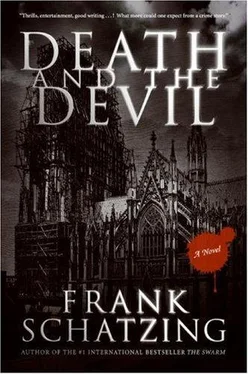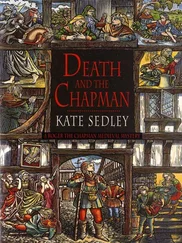Jaspar raised an eyebrow at him. “Oh, yes? And go where?”
“I—” That was the question. Where? “No idea. To Richmodis and Goddert’s place, perhaps?”
“Oh, brilliant!” Jaspar mocked. “What a genius! He’s too cowardly to go in himself, but he’s quite happy to put Richmodis in danger.”
“All right, all right.” Jacob turned away, his face red with shame. “A stupid idea, I agree.”
“It was. But we all say stupid things sometimes. Come on, let’s just go in and get it over with.”
Jaspar pushed open the door and they went in. It was dark in the room, just a few embers glowing in the fireplace.
“He hasn’t even kept the fire up, the useless lump!”
Jacob peered into the gloom. “You can’t see anything.”
“We’ll soon see something. Where’s the candlestick?”
Jaspar stomped across the room to a shelf opposite the fireplace, while Jacob tried to make something of the dark shapes. The table, a stool, the bench by the fire.
A shadow, massive, motionless.
“Jaspar—”
“Don’t interrupt. Now where’s that blasted candlestick?”
“There’s someone here.”
“What?” There was a clatter. A spark flared up, then another, and the room was gradually bathed in soft, golden candlelight. It fell on the fireside bench and on Rolof.
“God in heaven!” Jaspar whispered. Hesitantly they went over to him. Jacob felt he wanted to be sick. He also wanted to look away but found he couldn’t.
“Whatever have they done to him?”
Rolof’s eyes were staring at the ceiling. His nose had been smashed in. But that was a mere detail compared to the way the murderer had arranged the body. A long hank of thick dark hair cascaded down from his wide-open mouth onto his chest and curled up over his fat belly. Which had been—
“They’ve slit him open,” Jacob gasped.
Jaspar was grinding his teeth. “Yes.”
“But why? What had he done to them, goddammit? He was no danger to them. He…” His voice failed. With sudden realization, he pulled the hair out of Rolof’s mouth. “Richmodis,” he croaked.
Jaspar pointed to Rolof’s forehead. “Look.” It sounded almost matter-of-fact, as if he were drawing attention to some interesting object. Except that his finger was trembling.
Jacob leaned forward. “What on earth is that?”
There were smears on Rolof’s forehead. Symbols joining up to make a complicated pattern.
“Writing,” replied Jaspar. “That’s why he did that to him. The murderer needed blood to write.”
“And what—”
“A message.” He sank down on the bench beside Rolof and put his head in his hands.
Jacob shuddered. He was afraid to hear the truth, although by now he suspected it. “Out with it,” he said hoarsely. “What is the message?”
“ She’s alive. Silence. ”
Johann rested his chin on his hand and stared across the table, uncertain what to reply.
After Matthias had sent the servant to tell Urquhart the way to the old warehouse, Johann had tried to call an immediate meeting of the group, a vain hope on a busy weekday. At least Theoderich, a somewhat tipsy Daniel, and Heinrich von Mainz had turned up. In a few short sentences he told them about the hostage. Their reactions varied. While Heinrich, as usual, had no clear opinion, Theoderich looked unhappy. Johann could understand that. They had set off an avalanche. The situation was beginning to get out of control. Now it was Urquhart who was making the rules, while the original purity of their goal was being increasingly tarnished by crude necessity. The means were becoming an end.
Daniel, on the other hand, was delighted; he could not praise Urqu hart’s astute move highly enough. Johann felt disgusted at his own son. Of course Daniel was right. Though only from a coldly rational standpoint. More and more, Johann was asking himself whether they had not in fact become slaves to a barbaric attitude that was pushing them in the wrong direction.
After that he had tried to work for an hour but couldn’t keep his mind on it. Eventually he gave up and went home to pray and to go up and see the old woman to let her know what was happening and to take reassurance from her steadfastness of purpose.
The old woman was asleep.
He had stood at the window for a long time, staring out into the rain that had started. Evening was approaching and with it the time of the family meal, but he did not feel in the least hungry. Feeling weary, he asked Hadewig to leave him to his own devices for a while and had withdrawn to his study, hoping the night would pass quickly, even though he viewed the coming day with horror.
He had not been alone for long.
It was Kuno. The young patrician begged to be allowed to attend their meetings again.
Johann was silent, trying to hide his uncertainty behind a blank expression. Deep down inside he could understand Kuno better than ever. But they had gone too far. They could not go back now, and that was Kuno’s fatal mistake. Wanting to reverse everything, even if he did claim to support the cause wholeheartedly again.
Johann clasped his hands and slowly shook his head. “No,” he declared.
“What are you afraid of?” asked Kuno.
“Your unwillingness to accept the logical consequences of your decisions,” Johann replied. “You volunteer to take part in a struggle, but you want to fight it without weapons. You want to defeat your enemy, but at the same time spare him. Wars are won on the field of battle, not inside your head. I wouldn’t put it past you to destroy us all just because you thought you could save someone else.”
“That is not—” Kuno objected.
Johann raised his hand and cut him short. “I’m saying this because I think you are far too sentimental. Not that I’ve anything against feelings, but we should never have let you join the alliance. We had no choice, I suppose. None of us had. Now, though, I do have a choice. To trust you or to exercise caution.”
“And you don’t trust me?”
“No. You’d be lying if you tried to tell me you’d gotten over Gerhard’s death and given it your approval.”
“I never claimed I did! It’s just that I believe in our cause, as I always have done.”
“No, you don’t.”
Kuno started to say something, then hesitated.
“Well?” asked Johann.
“All I do know,” said Kuno in deliberate tones, “is that people who have done us no harm have had to die. We feel an injustice has been done to the members of our families who have lost their lives or their freedom, not because they harmed anyone, simply because they wanted to protect their rights. Yes, it’s true I agreed to a plan, the consequences of which I reject, and I am well aware there is something contradictory in that.” He leaned forward, looking Johann calmly in the eye. “But you, too, Johann Overstolz, subscribed to that plan. Has it not occurred to you by now that you cannot combat injustice by acting unjustly yourself?”
Johann nodded. “It has. And I respect what you have to say, Kuno. But you have just provided conclusive proof that we cannot rely on you. My answer is no, we will not take you back.”
Kuno’s face was expressionless as he stared back at Johann. Then he stood up and left the room without a further word.
He was both unhappy and relieved. If Johann would not make peace with him, then none of the others would. Blinded by Blithildis’s hatred, Johann and Matthias had abandoned all their principles. But this final decision from Johann set him free. Not free from guilt for having voted for the alliance and thus unwittingly contributing to Gerhard’s death. No one could ever absolve him from that. But he no longer had any obligation toward the unholy alliance.
Читать дальше












